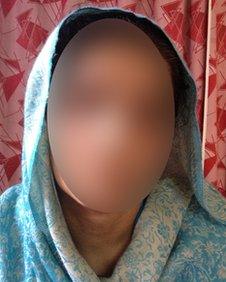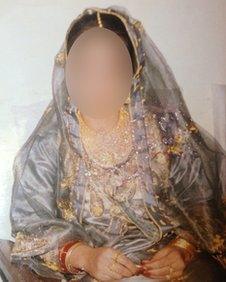Misery of Pakistan's abandoned wives
- Published
The BBC's Tulip Mazumdar meets women abandoned in Pakistan
An increasing number of Pakistani women say they have been forcibly separated from their children in the UK, and abandoned in their country of birth by their British husbands. The BBC's Tulip Mazumdar travelled to Pakistani-administered Kashmir to meet two such women. Their names have been changed for legal reasons.
When Shagufta's family told her she was marrying a young British man, and moving to Britain to start a whole new life there, she says she felt "excited".
"At that time I was very happy. I thought life in the UK would be very good. I thought my husband's family would be nice to me."
That is not how things turned out.

Shagufta has not seen her daughter for 10 years
Almost 11 years since she married and moved to the UK, she is back in Mirpur reminiscing over photos of her baby girl. She says her husband has left her stranded in Pakistan, and forcibly taken their only child.
"The problems started as soon as I got to the UK where I lived with my husband and my in-laws," she says.
"My husband treated me very badly. He used to beat me and even threaten to kill me. I wasn't allowed out of the house, and I was banned from speaking to anyone outside the family."
Shagufta says after her daughter was born, things got even worse.
Then one day, soon after her little girl had celebrated her first birthday, she says her bags were packed and she was taken to the airport. She was told she was going to see her family because her mother had died.
"When I arrived in Pakistan, I was met by my in-laws. They snatched my passport and told my brothers to come and take me away. I have been living without my daughter ever since."
We traced Shagufta's husband back to the UK, but he refused to speak to us.
'Tip of iceberg'
Shagufta's story is becoming an increasingly familiar one. Lawyers, charities and the British High Commission in Islamabad say they are coming across more women who say their British husbands have dumped them in Pakistan.
Whilst a minority of women do speak out, it is believed hundreds more stay silent.
Solicitor and chairperson of parental abduction charity Reunite, Anne-Marie Hutchinson, says she dealt with about 20 abandoned spouses cases in 2012, but says that's just "the tip of the iceberg".
"Very few manage to actually get assistance, the majority - I anticipate - are just dumped and that's it," she says. "If they were in the UK they could get divorced, they could get maintenance… but if they're in Pakistan, they have no claims.
"The other thing is, when they do dump her back in Pakistan, she is often ostracised in the community… People will say 'she's been sent back, she must have behaved terribly in England'."
There can be enormous family pressure on British-born Pakistani men to come to their native country to find a traditional Pakistani bride. The wife will not generally speak very much English and will have little in common with her British husband.
Aurangzeb Khan from Bradford, who was visiting family in Mirpur, says his "hands were tied" when he was made to marry his first cousin.
"We were totally different people. I was born and brought up in Britain with my English friends."
He abandoned his wife for five years after they were married, before they had any children, although he later allowed her to join him in the UK.
"I wouldn't say it's cruel. I was forced into the marriage and I retaliated," he says.
'Tricked'
Nearby, I met another woman, Sadia.
She says after she gave birth to her three sons in the UK, her in-laws made it very clear she was no longer of use to them.
"They would say we have got the children now, we don't need you. You should just work in the house. A wife's place is under her husband's feet."
She says she was eventually tricked into coming back to Pakistan on a family holiday, but when she arrived her passport was confiscated by her in-laws, and she was thrown out of their home, whilst they kept the children.
She says she eventually agreed to a divorce because she was told she would be allowed to keep her children if she signed the papers. But she says her husband's family took the boys back to the UK.
Sadia says her father has since forced her to remarry because he could not afford to look after her.

We spoke to Sadia's husband in Britain. He denied abandoning her and said she had chosen to leave the children with his family. He described her as "crazy" and said that she had been a bad wife.
There is limited help on hand for women like Shagufta and Sadia. The UK Foreign and Commonwealth Office says that it can put women like them in touch with charities and lawyers in the UK and Pakistan, but it cannot offer consular assistance to people who are not British nationals.
Most of these women were never in the UK long enough to get UK citizenship.
Azhar Mehmood runs a women's welfare group and works with the British High Commission in Mirpur to raise awareness about forced marriage - but is increasingly hearing from women who say they've been abandoned.
"There is a thinking in a few families that they want a good, pure Pakistani child so they have good heirs to their properties. They know they can leave these girls in Pakistan - and they won't be able to get much help."
Both Shagufta and Sadia would like to use the UK courts to get access to their children.
Despite the many obstacles facing them, both have vowed to continue fighting until they get to see their children again.
Gripping a photo of herself scooping up her three children in her arms on their front porch in the UK, Sadia says: "I dream about my three boys every night.
"Physically I am here, but my spirit is with them. I don't have any greed to come back to the UK, I just want to see my sons."
- Published5 March 2012